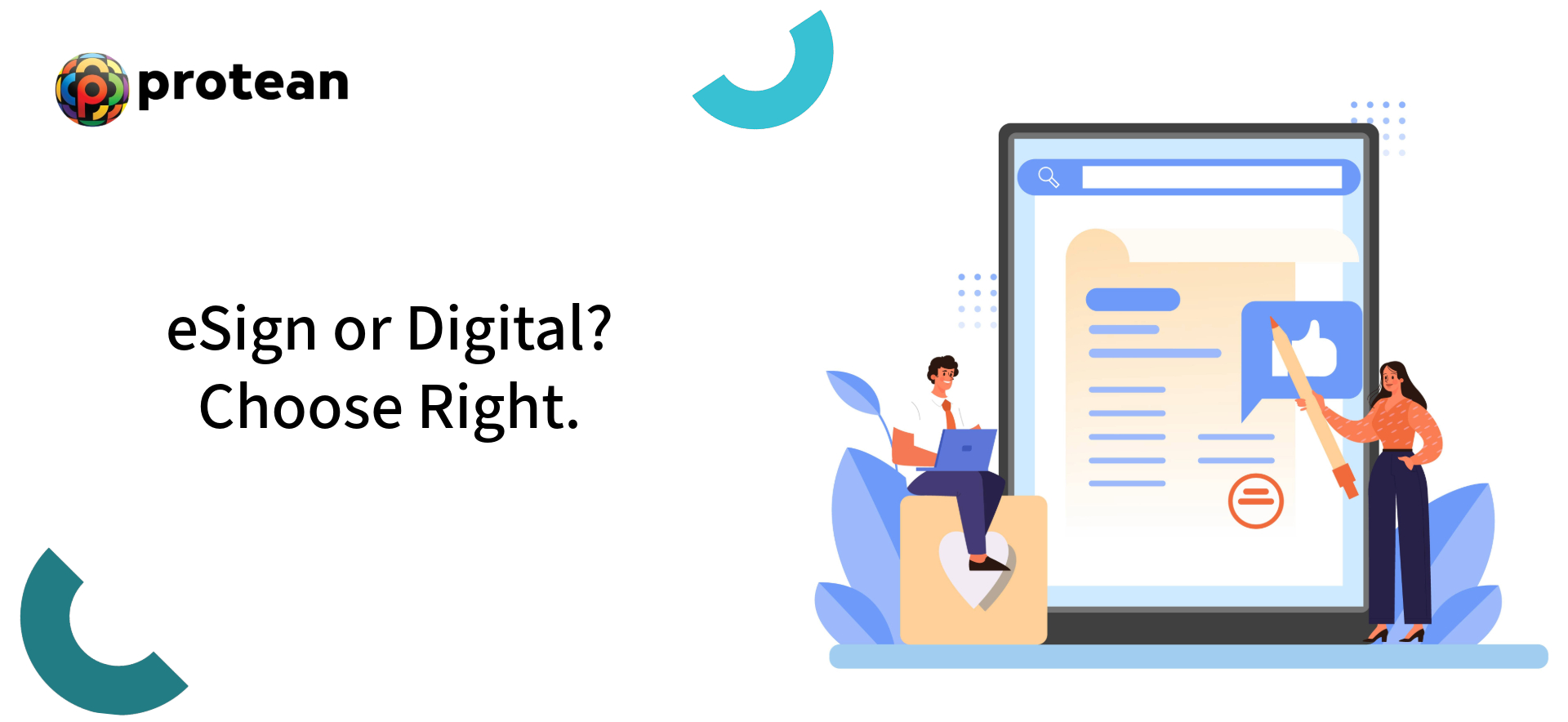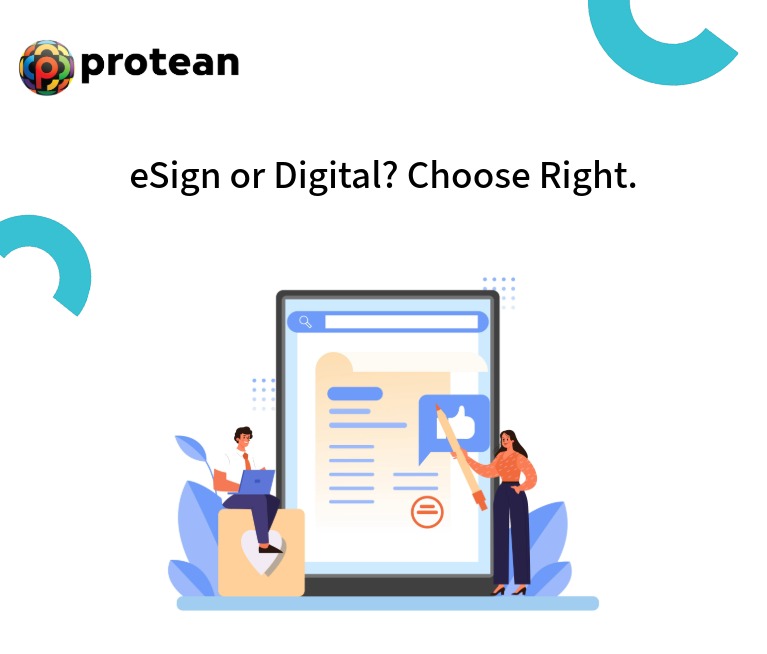Should you choose to eSign or use a digital signature? Let us learn about choosing the right option.
The terms eSign and Digital Signature are often used interchangeably. However, they differ significantly in terms of legal validity, security, and regulatory acceptance.
This distinction has direct implications for risk management, audit readiness, and operational efficiency.
With frameworks supported by UIDAI and providers like Protean eGov Technologies, choosing the appropriate method has become a strategic consideration for businesses navigating India’s evolving digital and financial infrastructure.
Let us learn about what is eSign, what is digital signature and choosing between the two in this article:
What is eSign
An eSign refers to any electronic method used to indicate consent or approval on a digital document.
Common eSign types are:
- Typing a name at the end of an email
- Scanning and pasting a handwritten signature into a PDF
- Clicking an “I Agree” checkbox
- Using stylus-based signature capture
eSignatures are widely adopted due to their convenience, especially in day-to-day agreements such as:
- HR onboarding
- Rental agreements
- Low-risk business contracts.
In India, eSign is legally recognised under the Information Technology Act, 2000, when facilitated by Certifying Authorities (CAs) licensed by Controller of Certifying Authorities (CCA).
Platforms such as Protean eSign enable Aadhaar-based authentication, making it easier for citizens and businesses to electronically sign documents securely and instantly from anywhere.
What is Digital Signature
A Digital Signature is a specific type of eSign. Here’re a few things to know about digital signature:
- It uses advanced cryptographic methods to ensure the authenticity, integrity, and legal validity of electronic documents.
- It functions through a system of public and private keys, where the signer’s private key encrypts a unique digital hash of the document.
- The recipient can then verify this hash using the public key embedded in the Digital Signature Certificate, confirming both the signer’s identity and that the document remains unchanged.
Licensed Certifying Authorities such as Protean eGov play a key role in issuing these certificates. Recent reforms have consolidated all previous classes into a single Class 3 certificate, now standard for both individual and organisational use.
Digital Signature vs eSign
Choosing between eSign and Digital Signature depends on your need for security, compliance, document integrity, and ease of implementation. Here’s a comparative breakdown:
1. Security
- Digital Signature: Uses asymmetric encryption and digital certificates to validate identity and ensure document integrity. It is highly secure and resistant to forgery.
- eSign: May or may not use encryption. Security depends on how the identity is verified (e.g., OTP, email verification).
2. Authentication and Trust
- Digital Signature: Backed by a licensed Certifying Authority (CA). The signature is cryptographically verified and trusted.
- eSign: Basic authentication (like Aadhaar OTP) suffices. Trust level is moderate and varies based on implementation.
3. Legal Validity
- Digital Signature: Recognised globally and meets stringent legal and regulatory standards including non-repudiation.
- eSign: Legally valid under the IT Act, but may not meet high-assurance requirements in regulated sectors.
4. Document Integrity
- Digital Signature: Ensures that the document is tamper-evident. Any changes post-signing invalidate the signature.
- eSign: Lacks built-in mechanisms to detect post-signature tampering unless coupled with audit trails.
5. Ease of Use and Implementation
- eSign: Simple to deploy, requires no hardware. Best suited for quick approvals and general agreements.
- Digital Signature: Requires issuance of a DSC and installation of supporting software or tokens. Slightly more complex but more secure.
6. Use Cases
- eSign: Ideal for Non-Disclosure Agreements, employee joining forms, vendor onboarding, retail account opening etc.
- Digital Signature: Essential for tax filings, legal agreements, government contracts, loan approvals, and audit-sensitive documentation.

What to Choose between eSign or Digital Signature
The choice between eSign and Digital Signature can depend on your specific use case. If you are managing low-risk agreements, onboarding employees, or getting routine approvals, eSign provides a cost-effective and easy-to-use solution. However, for regulated industries like finance, healthcare, legal, or government-facing processes where security, audit trails, and legal enforceability are paramount, Digital Signatures are the preferred standard. Organisations should evaluate their risk appetite, compliance mandates, and operational needs before selecting a solution.
Conclusion
Both eSign and Digital Signature serve the purpose of enabling paperless workflows. They differ significantly in how they ensure identity verification, document integrity, and compliance. eSign offers speed and convenience, while digital signatures provide robust security and trust.
Providers like Protean eGov Technologies play a pivotal role in offering secure, Aadhaar-based eSign services and Digital Signature Certificates tailored to India’s digital ecosystem.
Frequently Asked Questions
Q1. Is an eSign legally valid in India?
Yes, if performed using Aadhaar authentication through a licensed provider like Protean, it is valid under the IT Act, 2000.
Q2. Can I use a digital signature for signing contracts?
Absolutely. Digital Signatures are recommended for contracts, especially where legal enforceability is critical.
Q3. What’s the cost difference between eSign and digital signature?
eSign is usually pay-per-use and cheaper for large volumes. Digital signatures involve upfront costs for DSC issuance.
Q4. Do I need internet access to use digital signatures?
Yes, for verifying the certificate and using tokens. Some setups also allow offline usage post setup.
Q5. Can both be integrated via API?
Yes. Most modern platforms, including those from Protean, offer robust API support for seamless integration of both eSign and digital signature services.

